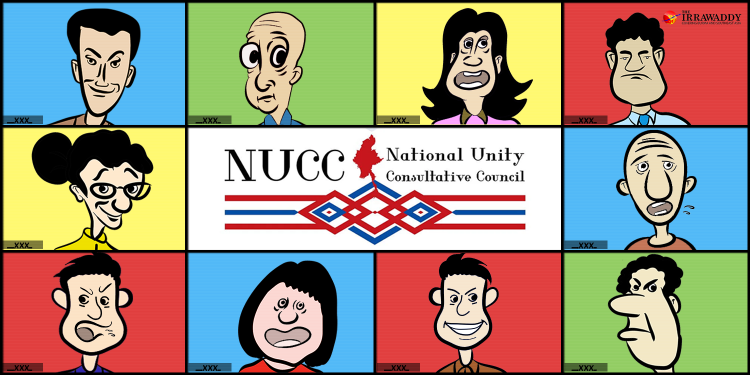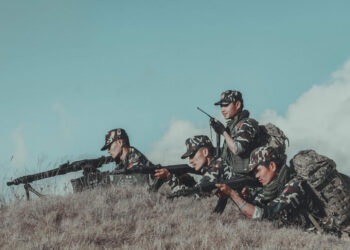The National Unity Consultative Council (NUCC) made a sorry spectacle of itself earlier this month.
I spent four hours of my precious time watching the live broadcast of the NUCC’s press conference held after its so-called Second People’s Assembly on April 11. Before the press conference, I had high expectations of learning about the progress the group has made since its formation three years ago, but what I heard just filled me with dismay.
I do appreciate the NUCC for holding the People’s Assembly and press conference, despite their shortcomings. Exercising my fundamental rights as an engaged citizen, and without representing any political affiliation, I am writing this in the hope that it will help the NUCC play a greater political leadership role in the revolution.
My first impression of the NUCC—a platform established to provide leadership during Myanmar’s transition as an advisory body to the National Unity Government (NUG)—was that it lacks professionalism. By this, I simply mean the ability to demonstrate competence, ethics, respectful behavior and, most importantly, accountability. The professionalism of some individuals involved in the NUCC is open to question. At the four-hour press conference, three solid hours were wasted on members blaming each other and arguing over whether the assembly had succeeded or not. This squabbling eclipsed the most important points of discussion.
It has become a tradition in Myanmar political circles that when individuals lack access to, or dare not speak on, official platforms, they smear or attack their rivals on social media. In the worst cases, they abuse their popularity on social media to attack anyone holding different views.
It is hideously ugly that such a negative practice should extend to a live and official press conference. It is a shame that one participant even had to be dismissed from the conference on grounds of inappropriate behavior. We expected greater decorum from those who want to lead the country.
I can only assume the argument resulted from a lack of trust between the groups and individuals involved in the NUCC. It is an open secret that the members, with their varied backgrounds, have little trust in each other. It is an inherent flaw in the NUCC, and from the time it was formed, many observers have urged that steps be taken to build trust among members.
I naively hoped that individuals involved in the NUCC would respond properly and silence the body’s critics over time. But there has been little improvement over the past three years. This was starkly illustrated when members heatedly argued during the live broadcast about whether the conference had been a success. This exchange was just the tip of an iceberg of underlying distrust within the NUCC.
It is okay to have diverse opinions, but without even a sense of basic trust, or of the common ground needed for such diverse groups to work together, it is becoming a serious problem—serious enough to make one question one’s faith in the idea that diversity is really a strength for Myanmar.
The NUCC said its primary goal is to create an inclusive landscape. But, over the past three years, its membership has only shrunk, indicating that the NUCC needs to reform urgently.
I honestly wonder if it is really practical to include so many groups in the NUCC. Are its goals really achievable in a context like Myanmar’s, with so many groups involved? Well, the Union Peace Conferences that were held under the two previous governments should provide an answer to that. Sometimes we confuse tokenism with inclusion.
When it comes to inclusion, priority must be given to those groups that can deliver results. Very few ethnic revolutionary organizations/ethnic armed organizations (EAOs) and political parties are involved in the NUCC. A study conducted late last year revealed that resistance groups in central Myanmar believe their voices are not heard by the NUCC. The study also stressed that there is a serious need to include key EAOs.
A report by the NUCC released in February claims that the body held 104 meetings in 2021, 69 in 2022, and 80 in 2023. These figures look impressive on paper. But what were the results? Last year there were more statements than tangible results, despite some initial signs of success in early 2021. These figures show that the NUCC is more concerned with process than results.
The decisions made at the Second People’s Assembly were not encouraging either, meaning the NUCC lacks the ability to make important decisions. One of the common excuses given is that the NUCC needs full consensus to make any decision. But Section 13(a) of Chapter 3 in the federal charter says decisions can be made when 65 percent of stakeholders agree. Why doesn’t the NUCC try to fix the situation if the perceived need for a full consensus is causing the problem, even after three years?
Another point is that the NUCC has only held two People’s Assemblies, though it promised to hold one every six months. Even if the NUCC has failed to reach any concrete agreements, it should at least be demonstrating that relations between members are improving. But it can’t.
To get tangible results, the NUCC needs to establish the correct priorities. I accept it takes time to envisage and build a future country. However, appropriate priorities must be set, and these must be responsive to changing circumstances.
The NUCC may be happy to wait another six months to hold its next conference. But the people cannot wait. The military junta will not pause its terror campaign for six months.
The three outcomes of the NUCC’s second conference—a pledge to reform the administration of the NUG; a vague statement in response to the junta’s activation of the national conscription law; and the scrapping of the 1982 citizenship law—reflect a ridiculous set of priorities. An additional 21 proposals and recommendations made at the conference were positive, but there was no prioritization of these, and—worst of all—no implementation timeframe at all.
It would be extremely unfair if the NUCC only makes decisions, and the shadow NUG is responsible for implementing those decisions. (I am not protecting the NUG. The NUG itself has mountains of shortcomings. Here, however, I would like to focus on the NUCC.) Some suggestions made by NUCC members are impractical because they would require a lot of resources and extensive debate even in peacetime. Poor prioritization will increase the country’s suffering.
Lastly, the NUCC should make greater efforts to inform the public and explain its work. This is a weakness that dates back to the establishment of the NUCC. People know little about the organization, so they have little trust in it.
An opinion survey conducted in March shows that 60 percent of respondents have trust in the NUCC. This is lower than other organizations like the NUG and the People’s Defense Force, according to the same survey. In reality, however, my experience working with people on the ground shows these numbers to be too high. The survey methodology of purposive sampling, which is less than ideal for producing representative data for a general population, would be one of the reasons for the high percentage. And 27 percent of respondents either did not know about the NUCC or were unwilling to answer. The number is higher than for other groups. Perhaps it is because the NUCC failed to organize the People’s Assembly as planned and to inform the public about it.
The issues that I have raised here are nothing new. These are the defects that the NUCC was born with. And the April 11 press conference was just further evidence that the NUCC still hasn’t been able to fix them.
I would like to echo the question of a journalist who asked if the NUCC would apologize to the people for failing to deliver results.
I want to conclude with a statement made by revolutionary musician Lynn Lynn at a recent fundraising concert, and a message recently sent by a resistance fighter from the front line.
“Comrades who were killed and injured in action are not stepping stones [for politicians]. They are a warning to politicians and businessmen who secretly seek self-interests in the name of ‘ending the dictatorship,’” said Lynn Lynn.
The message sent by the young resistance fighter from the front line reads: “Brother, will we be able to return home this year? I think it no longer depends on Min Aung Hlaing, but on our higher-ups.”
Well, as he said, Myanmar’s future is very much linked to the leaders of the respective revolutionary organizations, including the NUCC and the NUG.
Desmond is an analyst of international development focusing on the peace process and transition.
















